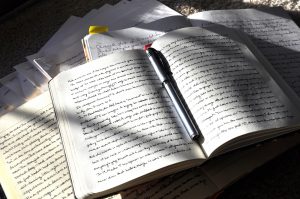 A large component of self-regulated learning is self-awareness in one’s strengths, weaknesses, and plans. While trying to find ways to encourage self-regulated behaviors that were easily monitorable, I stumbled across a research paper: The Effect of Reflective Science Journal Writing on Students’ Self-Regulated Learning Strategies by N. Al-Rawahi and S. Al-Balushi.
A large component of self-regulated learning is self-awareness in one’s strengths, weaknesses, and plans. While trying to find ways to encourage self-regulated behaviors that were easily monitorable, I stumbled across a research paper: The Effect of Reflective Science Journal Writing on Students’ Self-Regulated Learning Strategies by N. Al-Rawahi and S. Al-Balushi.
The research:
Their study found that students who wrote in science reflective journals showed a significant increase in self-regulation strategy use compared to a control group. Al-Rawahi and Al-Balushi used a template journal (see figure 1, pg. 372 for their template). The template consisted of six areas: my lesson objectives, my observations, my dialogue with others, my main conclusions from this lesson, at the end of this lesson I feel that, and my evaluation. Each section had sentence prompts for students to complete, but then gave ample additional room for students to add more. They focused heavily on monitoring and evaluating understanding of content, an important part of self-regulated learning. The limitations to using such a template is that students are only going to write exactly what they are asked about. It does not allow for students to explore other thoughts and feelings that they may have outside the context of the content and classroom, which could have an impact on their learning.
What this means for my inquiry:
I am eager to use reflective journals as a means of increasing self-regulation skills and self-efficacy, but I would not follow the same template that was outlined in the paper. I want my students to be able to express themselves however they feel is best – writing in a journal, on a blog, audio recordings, etc. I would use similar prompts outlined in the article, but I may add more specific prompts so I can assess their development of these skills over time. I would also not have students fill this out after every class, but at least twice a week. Students are welcome and encouraged to write more frewuently, but I would not impose it on the students as I know that they are already very busy and this may be a hard sell for a lot of the students. I would “mark” the journals for completeness and thoroughness, and give them completion marks. Hopefully this extrinsic motivator will initially get the ball rolling so that intrinsic motivation will take over once students see the benefits.
Reference:
Al-Rawahi, N. M., & Al-Balushi, S. M. (2015) The Effect of Reflective Science Journal Writing on Students’ Self-Regulated Learning Strategies. International Journal of Environmental And Science Education, 10(3), 367-379.
